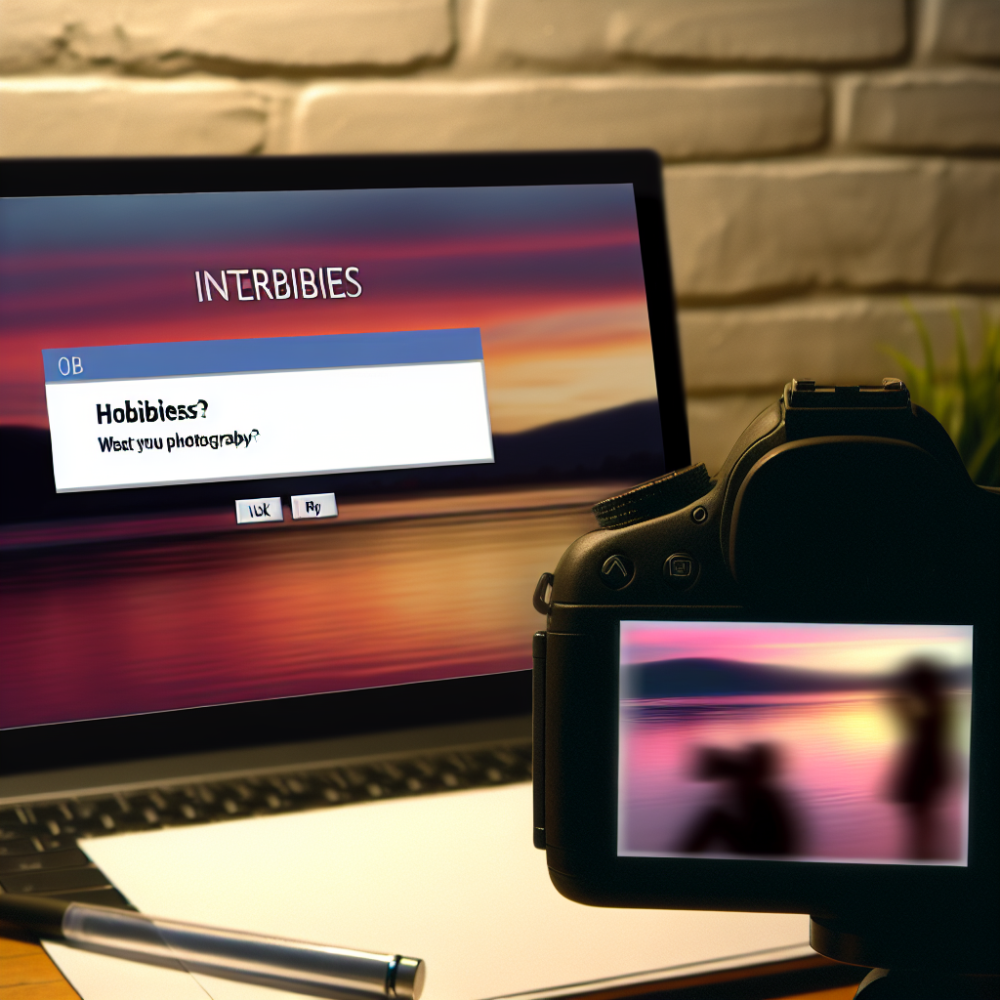Exploring the Benefits of Discussing Hobbies in Job Interviews
In job interviews, it is common for interviewers to ask candidates about their hobbies. While this question may seem unrelated to the job at hand, it actually serves a purpose. Exploring the benefits of discussing hobbies in job interviews can shed light on why interviewers ask this question and how it can benefit both the candidate and the employer.
One of the main reasons interviewers ask about hobbies is to gain insight into the candidate’s personality and interests. By discussing hobbies, interviewers can get a glimpse into what motivates and excites the candidate outside of work. This can help them assess whether the candidate would be a good fit for the company culture and team dynamics. For example, if a candidate mentions that they enjoy playing team sports, it may indicate that they are a team player and can work well in a collaborative environment.
Furthermore, discussing hobbies can also provide interviewers with a better understanding of the candidate’s skills and abilities. Hobbies often require certain skills and can showcase a candidate’s strengths that may not be evident from their work experience alone. For instance, if a candidate mentions that they enjoy painting, it may indicate that they have a creative side and attention to detail, which could be valuable in certain roles such as graphic design or marketing.
Moreover, discussing hobbies can help create a more relaxed and conversational atmosphere during the interview. Job interviews can be stressful for candidates, and talking about hobbies can help break the ice and ease tension. It allows candidates to showcase their personality and interests in a more informal setting, which can help them feel more comfortable and confident. This can lead to a more authentic and genuine conversation, allowing interviewers to better assess the candidate’s fit for the role.
From the candidate’s perspective, discussing hobbies in a job interview can also be beneficial. It provides an opportunity for candidates to showcase their unique qualities and stand out from other applicants. By sharing their hobbies, candidates can demonstrate their passion, dedication, and commitment to personal growth. This can make them more memorable to the interviewer and increase their chances of being selected for the position.
Additionally, discussing hobbies can also help candidates establish a connection with the interviewer. If the interviewer shares similar hobbies or interests, it can create a sense of rapport and common ground. This can make the interview experience more enjoyable for both parties and potentially lead to a positive impression. Building a connection with the interviewer can also increase the likelihood of receiving a job offer, as it shows that the candidate is not only qualified but also someone the interviewer can envision working with.
In conclusion, discussing hobbies in job interviews can provide numerous benefits for both the interviewer and the candidate. It allows interviewers to gain insight into the candidate’s personality, skills, and fit for the company culture. It also helps create a more relaxed and conversational atmosphere, allowing candidates to showcase their unique qualities and establish a connection with the interviewer. Therefore, candidates should embrace the opportunity to discuss their hobbies and use it as a chance to make a lasting impression.
How to Showcase Your Hobbies as Valuable Skills in an Interview

When it comes to job interviews, one question that often catches candidates off guard is, “What are your hobbies?” While it may seem like a casual question, it is actually an opportunity for you to showcase your skills and qualities that are relevant to the job you are applying for. In this article, we will discuss how you can effectively highlight your hobbies as valuable skills during an interview.
First and foremost, it is important to choose hobbies that are relevant to the job you are interviewing for. For example, if you are applying for a marketing position, you could mention that you enjoy photography as a hobby. This demonstrates your creativity and attention to detail, which are valuable skills in the field of marketing. Similarly, if you are applying for a job in customer service, you could mention that you enjoy playing team sports. This shows that you are a team player and can work well with others.
Once you have identified the hobbies that are relevant to the job, the next step is to explain how these hobbies have helped you develop valuable skills. For instance, if you enjoy playing a musical instrument, you could mention that it has taught you discipline and perseverance. These qualities are highly valued in the workplace, as they demonstrate your ability to stay focused and overcome challenges. Similarly, if you enjoy hiking, you could talk about how it has taught you problem-solving skills and the ability to adapt to different situations. These skills are particularly important in fast-paced and dynamic work environments.
In addition to highlighting the skills you have developed through your hobbies, it is also important to mention any achievements or recognition you have received. For example, if you have won any awards or competitions related to your hobby, be sure to mention them during the interview. This demonstrates your commitment and dedication to your hobbies, which can translate into your work ethic. Employers are always looking for candidates who are passionate and driven, so showcasing your achievements can set you apart from other applicants.
Furthermore, it is important to emphasize how your hobbies can benefit the company or the role you are applying for. For instance, if you enjoy writing as a hobby, you could mention that it has improved your communication skills and attention to detail. These skills are essential in many job roles, such as content writing or editing. By highlighting how your hobbies can contribute to the success of the company, you are showing the interviewer that you are not only a good fit for the job but also a valuable asset to the organization.
In conclusion, the question “What are your hobbies?” during a job interview is an opportunity for you to showcase your skills and qualities that are relevant to the job. By choosing hobbies that are relevant, explaining how they have helped you develop valuable skills, mentioning any achievements or recognition, and emphasizing how they can benefit the company, you can effectively highlight your hobbies as valuable skills during an interview. Remember to be confident and enthusiastic when discussing your hobbies, as this will leave a lasting impression on the interviewer.
The Impact of Hobbies on Personal and Professional Development
The Impact of Hobbies on Personal and Professional Development
In today’s fast-paced world, it is easy to get caught up in the demands of work and forget to make time for personal interests and hobbies. However, engaging in hobbies can have a significant impact on both personal and professional development. Hobbies provide an avenue for self-expression, relaxation, and personal growth, which can ultimately enhance one’s overall well-being and success in the workplace.
Firstly, hobbies offer a means of self-expression. Engaging in activities that we enjoy allows us to express ourselves in ways that may not be possible in our professional lives. Whether it is painting, playing a musical instrument, or writing, hobbies provide an outlet for creativity and individuality. By engaging in these activities, we can tap into our inner passions and express ourselves authentically, which can boost self-confidence and self-esteem.
Moreover, hobbies provide a much-needed break from the stresses of everyday life. In a world where we are constantly bombarded with work-related responsibilities and deadlines, it is crucial to find time for relaxation and rejuvenation. Hobbies offer a way to unwind and recharge, allowing us to return to our professional lives with renewed energy and focus. Taking time for ourselves and engaging in activities that bring us joy can help reduce stress levels and prevent burnout, ultimately leading to increased productivity and job satisfaction.
Furthermore, hobbies can contribute to personal growth and development. When we engage in activities that we are passionate about, we are more likely to push ourselves outside of our comfort zones and take on new challenges. Whether it is learning a new language, taking up a sport, or joining a book club, hobbies provide opportunities for personal growth and learning. By continuously challenging ourselves and acquiring new skills, we can expand our horizons and become more well-rounded individuals, which can positively impact our professional lives.
Additionally, hobbies can foster important qualities and skills that are transferable to the workplace. For example, engaging in team sports can enhance teamwork and collaboration skills, while participating in creative activities can improve problem-solving and critical thinking abilities. Hobbies can also teach us discipline, perseverance, and time management, all of which are valuable traits in any professional setting. By honing these skills through our hobbies, we can become more effective and efficient in our work, leading to increased success and advancement opportunities.
In conclusion, hobbies have a profound impact on personal and professional development. They provide an avenue for self-expression, relaxation, and personal growth, which can enhance overall well-being and success in the workplace. By engaging in activities that we enjoy, we can tap into our inner passions, reduce stress levels, and foster personal growth. Moreover, hobbies can contribute to the development of important qualities and skills that are transferable to the workplace. Therefore, it is essential to make time for hobbies and prioritize personal interests alongside professional responsibilities. By doing so, we can achieve a healthy work-life balance and unlock our full potential both personally and professionally.
Why Employers Ask About Hobbies in Interviews and How to Respond Effectively
Why Employers Ask About Hobbies in Interviews and How to Respond Effectively
During a job interview, you may be asked a variety of questions to assess your qualifications and fit for the role. One question that often catches candidates off guard is, “What are your hobbies?” While it may seem like a casual inquiry, employers have specific reasons for asking about your hobbies and interests. In this article, we will explore why employers ask about hobbies in interviews and provide tips on how to respond effectively.
Firstly, employers ask about hobbies to gain insight into your personality and character. They want to know what you enjoy doing in your free time and how you spend your energy outside of work. By understanding your hobbies, employers can assess whether you possess qualities that align with the company culture and the role you are applying for. For example, if you mention that you enjoy team sports, it may indicate that you are a collaborative and team-oriented individual, which could be valuable in a role that requires strong interpersonal skills.
Secondly, employers ask about hobbies to gauge your level of commitment and dedication. Hobbies often require time, effort, and perseverance. By sharing your hobbies, you can demonstrate that you are capable of committing to something and seeing it through. For instance, if you mention that you enjoy playing a musical instrument and have been practicing for several years, it shows that you have the discipline and dedication to develop a skill over time. This can be particularly relevant for roles that require long-term projects or continuous learning.
Furthermore, employers ask about hobbies to assess your ability to manage work-life balance. In today’s fast-paced and demanding work environments, employers value candidates who can effectively balance their personal and professional lives. By discussing your hobbies, you can showcase your ability to prioritize and manage your time efficiently. For example, if you mention that you enjoy hiking and make it a point to go on regular weekend hikes, it demonstrates that you can maintain a healthy work-life balance, which can contribute to your overall well-being and job satisfaction.
Now that we understand why employers ask about hobbies, let’s discuss how to respond effectively. Firstly, it is important to be genuine and authentic in your response. Choose hobbies that genuinely interest you and reflect your true personality. Employers can often sense when candidates are trying to impress or provide answers they think the interviewer wants to hear. By being authentic, you can establish a genuine connection with the interviewer and showcase your true self.
Secondly, it is essential to highlight transferable skills and qualities through your hobbies. Consider how your hobbies can relate to the job requirements and emphasize the skills and qualities you have developed through them. For instance, if you enjoy photography, you can mention how it has honed your attention to detail and creativity, which could be valuable in a role that requires problem-solving and innovation.
Lastly, it is crucial to tie your hobbies back to the job and the company. Show how your hobbies align with the company’s values and culture. Research the company beforehand and find common ground between your hobbies and the organization’s mission or industry. This demonstrates that you have taken the time to understand the company and have a genuine interest in being a part of it.
In conclusion, employers ask about hobbies in interviews to gain insight into your personality, assess your commitment and dedication, and evaluate your ability to manage work-life balance. By responding effectively, you can showcase your true self, highlight transferable skills, and demonstrate your alignment with the company. Remember to be authentic, emphasize relevant qualities, and tie your hobbies back to the job and the company. With these tips in mind, you can confidently navigate the “What are your hobbies?” question and leave a lasting impression on your interviewer.





